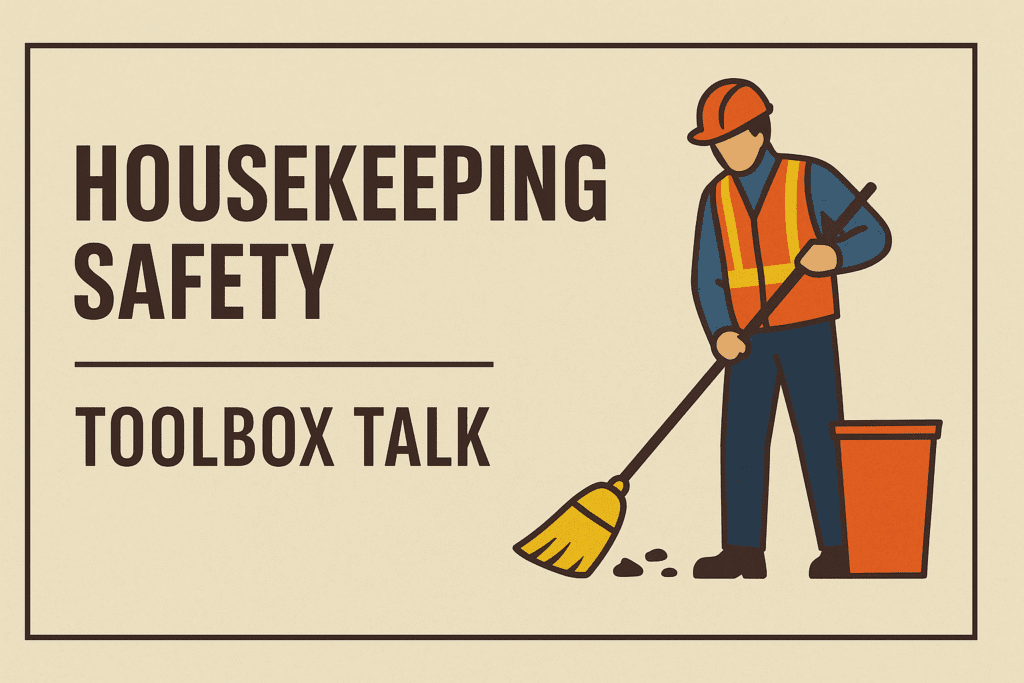
Housekeeping Safety TBT
Good morning team,
Today’s talk is about Housekeeping Safety — and no, we’re not talking about cleaning your home. We mean keeping our workplace organized, clean, and hazard-free.
You might think housekeeping is just about making things look tidy, but in the workplace, it’s much more than that. Poor housekeeping can cause slips, trips, falls, fires, and even serious injuries.
On the other hand, good housekeeping:
- Reduces accidents.
- Improves efficiency.
- Creates a positive safety culture.
- Makes emergency response faster and easier.
1. Why Housekeeping Safety Matters
- Slips, trips, and falls are one of the top causes of workplace injuries.
- Clutter can hide hazards and block emergency equipment.
- Poor housekeeping contributes to fire risks.
- An organized site boosts morale and productivity.
2. Hazards from Poor Housekeeping
2.1 Slips
- Wet or oily floors not cleaned promptly.
- Spills left unattended.
2.2 Trips
- Tools, materials, or cables left in walkways.
- Uneven flooring and unmarked changes in level.
2.3 Falls
- Working on surfaces covered in debris.
- Cluttered access to ladders and platforms.
2.4 Fire Hazards
- Accumulation of waste materials like paper, wood, and packaging.
- Flammable liquids stored improperly.
2.5 Blocked Exits and Equipment
- Obstructed fire extinguishers, emergency exits, or control panels.
3. Elements of Good Housekeeping
3.1 Clean as You Go
- Don’t wait for the end of the shift to clean up.
- Remove debris and waste immediately after tasks.
3.2 Proper Storage
- Store tools and equipment in designated locations.
- Keep flammable substances in approved containers and storage areas.
3.3 Clear Walkways
- Keep aisles, stairs, and exits free from obstructions.
- Manage cables and hoses to prevent tripping.
3.4 Waste Disposal
- Use the correct bins for different waste types.
- Empty bins regularly to prevent overflow.
3.5 Spill Control
- Clean spills immediately.
- Use absorbents and barriers for oil or chemical spills.
4. Housekeeping and Safety Procedures
- Assign housekeeping responsibilities for every area.
- Include housekeeping checks in daily inspections.
- Report hazards immediately — don’t wait for someone else to do it.
- Ensure adequate lighting to spot hazards.
5. PPE for Housekeeping Tasks
- Gloves to protect from sharp or dirty materials.
- Safety boots with slip-resistant soles.
- High-visibility clothing when working in traffic areas.
- Safety glasses for dusty cleanup work.
6. Do’s and Don’ts
✅ Do:
- Put tools back in place after use.
- Clean spills promptly.
- Keep storage areas organized.
- Dispose of waste daily.
❌ Don’t:
- Leave materials lying around.
- Block emergency routes or exits.
- Ignore hazards you notice.
- Store flammable waste near ignition sources.
7. Real-Life Case Study
A worker tripped over an air hose left across a walkway, falling into a stack of sharp metal sheets. He suffered deep cuts and a fractured wrist. The investigation showed no cable management system and no daily housekeeping checks in place.
Lesson: Simple housekeeping measures could have prevented this injury.
8. Worker Engagement – Q&A
- What’s the most common cause of slips and trips in the workplace?
- Why should walkways be kept clear at all times?
- How can “clean as you go” prevent accidents?
9. Closing Words – Bringing It Back to the Start
Alright team, we started this morning by talking about how good housekeeping is more than just cleanliness — it’s about safety, efficiency, and teamwork.
Every trip hazard you remove, every spill you clean, and every tool you put away makes our workplace safer for everyone.
Housekeeping is everyone’s responsibility — not just the cleaners or supervisors. If you see it, fix it, and if you can’t fix it, report it immediately.
Let’s keep our site organized, hazard-free, and ready for safe, productive work every day.
Stay alert, stay safe, and let’s have a productive day.
I am interested in this topic
Thank you